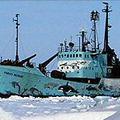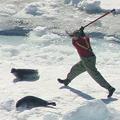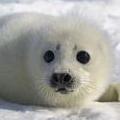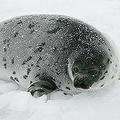 為了避免海洋看守保育協會(Sea Shepherd Conservation Society)與2008年的獵海豹活動發生衝突,加拿大政府於21日發出聲明,警告該組織船隊的其中一艘船艦,將會違反這個國際性的海洋傳統協議。
為了避免海洋看守保育協會(Sea Shepherd Conservation Society)與2008年的獵海豹活動發生衝突,加拿大政府於21日發出聲明,警告該組織船隊的其中一艘船艦,將會違反這個國際性的海洋傳統協議。
加拿大運輸基礎建設與社區部長肯隆(Lawrence Cannon)在發給M/Y莫瓦號船長的傳真中,指示該船艦不得進入加拿大海域,並表示:「如果不遵守規定,將可能被加拿大法律起訴。」
海洋看守保育協會的創辦人是瓦特森(Paul Watson) 船長,他表示莫瓦號目前在百慕達,而他計劃將航行到聖勞倫斯灣、紐芬蘭外海的大西洋和拉不拉多半島,意圖去干擾加拿大一年一度的獵海豹活動。
瓦特森回覆給部門的信中表示:「莫瓦號將不會遵守任何國際海事組織(IMO)的協議,因為,這些協議只適用商船,而海洋看守保育協會的莫瓦號只是一艘註冊的遊艇。雖然,莫瓦號將於下週進入加拿大的專屬經濟海域,但它將不會進入12英哩範圍內的領海。」
從1970年代開始,瓦特森利用了各式各樣的船艦向加拿大獵殺海豹活動示威,並且從1979年開始,以「海洋看守組織」船艦對抗獵捕行動。他曾因為這些示威行動被攻擊,甚至被捕,但對他來說,這些並沒有任何嚇阻效果。
 加拿大的漁業暨海洋部部長荷姆(Loyola Hearn)在3月10日宣佈,這一季的可容許獵捕量是27萬5千頭北極豎琴小海豹,而整個海豹族群的數量超過5百50萬隻。2008年的雞冠海豹可獵捕數量定為8200隻,而總族群數量約為60萬隻。
加拿大的漁業暨海洋部部長荷姆(Loyola Hearn)在3月10日宣佈,這一季的可容許獵捕量是27萬5千頭北極豎琴小海豹,而整個海豹族群的數量超過5百50萬隻。2008年的雞冠海豹可獵捕數量定為8200隻,而總族群數量約為60萬隻。
加拿大的商業獵捕海豹行為是目前全世界規模最大的海洋哺乳動物獵殺行動。2007年,有超過22萬4千隻的海豹被捕殺,而其中的98%都是未滿3個月大的小海豹。
部長荷姆在國會中代表紐芬蘭暨拉布拉多省的人民表示:「對居住在大西洋岸、魁北克省和北方地區的無數鄉下聚落來說,獵捕海豹是他們最重要的經濟支柱。我們不但考慮到這些民眾的需求,我們也根據科學研究進行決策,以期獵捕海豹不但經濟層面可行,更可以達到永續。」
瓦特森並不同意這種說法,他表示:「在計算海豹獵捕額度時,並沒有考慮全球暖化致使冰層覆蓋率降低所帶來的威脅。」荷姆則以要求加拿大科學家加速調查豎琴海豹數量來回應這項指控。
然而在2007年12月19日,歐盟食品安全委員會應歐盟執委會的要求,發表《獵捕海豹的動物福利觀點》報告,並表示沒有任何科學證據可以支持加拿大政府所宣稱,獵捕海豹的商業行為是符合人道。
 在檢視加拿大的商業獵捕海豹行為時,歐盟食品安全委員會的科學家發現:
在檢視加拿大的商業獵捕海豹行為時,歐盟食品安全委員會的科學家發現:
• 實際上有強力的證據顯示,並沒有100%的有效捕殺。
• 證據也顯示,加拿大的商業獵捕海豹行為,使動物遭受巨大的痛苦與折磨。
• 獵海豹的人常常沒有遵守加拿大的規定,例如必須親自檢查頭骨或進行閃光反射測試。
• 相對於現行的作法,若海豹不是固定不動的,或者獵人站在浮冰上以致搖晃不已,都不應該獵殺海豹。
• 獵捕海豹應該要開放給獨立單位檢查,並且不得有不適當的干涉。
歐盟食品安全委員會(EFSA)的結論是,海豹應該被當成有感覺的海洋哺乳動物,他們可以感受疼痛、悲痛、害怕,以及其他型式的痛苦,他們不是加拿大所歸類的「魚」。他們也建議海豹應該被保護免於捕殺與剝皮,這些都帶給他們疼痛、折磨和可避免的痛苦。
2007年國際間對捕殺海豹行為的反對聲浪高漲,致使比利時和荷蘭都頒布國家禁令,禁止海豹產品。而在德國、義大利和奧地利也在考慮類似的禁令,要關閉海豹毛皮類製品的市場。
瓦特森身為加拿大公民,他向加拿大政府清楚的表示,海洋看守保育協會船艦一定會干擾今年的獵捕行動,絕對不會打退堂鼓。他表示:「我們的船艦將會駛進聖勞倫斯灣保衛海豹免於加拿大獵人的暴力,及他們對生態的輕率與魯莽。」
 他在寫給肯隆部長的信中表示:「我在國際上的夥伴們都已經準備好,在這項議題上對抗政府,並且無懼任何起訴或肢體上的傷害,這些都不會阻怯我們站出來,保護這些無辜小海豹的堅定立場。海洋看守保育協會的活動將一如以往,非常小心以確保沒有人員會因此受傷,生命的神聖是我們最優先的考量。」
他在寫給肯隆部長的信中表示:「我在國際上的夥伴們都已經準備好,在這項議題上對抗政府,並且無懼任何起訴或肢體上的傷害,這些都不會阻怯我們站出來,保護這些無辜小海豹的堅定立場。海洋看守保育協會的活動將一如以往,非常小心以確保沒有人員會因此受傷,生命的神聖是我們最優先的考量。」
In an attempt to prevent the Sea Shepherd Conservation Society from interfering with this year's seal hunt, the Canadian government Friday issued a warning to the organization that one of its vessels is believed to be "in contravention of international maritime conventions."
In a fax to the Master of the M/Y Farley Mowat, Lawrence Cannon, minister of transport, infrastructure and communities, directed the vessel not enter Canadian waters. "If this order is not complied with you will be subject to prosecution under Canadian law."
Sea Shepherd founder Captain Paul Watson said the Farley Mowat is in Bermuda and he plans to sail her to the Gulf of St. Lawrence and the Atlantic Ocean off the coast of Newfoundland and Labrador to intervene in Canada's annual seal hunt.
Watson replied to the minister that "the ship does not comply with all the IMO [International Maritime Organization] conventions because "the conventions apply to a commercial ship and the Sea Shepherd ship Farley Mowat is a registered yacht." "Although the Farley Mowat WILL be entering the Canadian Economic Exclusion Zone next week, we will not be entering the 12 mile territorial limit," Watson informed the minister.
In a variety of vessels, Watson has demonstrated against the Canadian seal hunt since the mid-1970s and has taken Sea Shepherd vessels to the hunt since 1979. He has been attacked and arrested for these demonstrations, but has not been deterred.
On March 10, Canadian Minister of Fisheries and Oceans Loyola Hearn announced that this season's total allowable catch would be 275,000 harp seal pups, out of a seal herd of more than 5.5 million animals.
The 2008 hooded seal total allowable catch has been set at 8,200 animals out of a herd of 600,000.
Canada's commercial seal hunt is the world's largest hunt for marine mammals. Last year over 224,000 seals were killed, 98 percent of them pups under three months of age.
"The seal hunt is an economic mainstay for numerous rural communities in Atlantic Canada, Quebec and the North," said Minister Hearn, who represents the people of Newfoundland and Labrador in the Canadian Parliament.
"It's with these people in mind we make decisions based on science to help maintain an economically viable and sustainable seal hunt," he said.
Watson argues that, "The threat of diminishing ice coverage due to global warming has not been factored into the decision to set quotas." Hearn has responded to such accusations by directing Canadian scientists to accelerate the next harp seal population survey.
But on December 19, 2007, at the request of the European Commission, the European Food Safety Authority released its report on the Animal Welfare Aspects of Seal Hunting, finding that there is no scientific evidence to support the Canadian government's claims that its commercial seal hunt is humane.
In its examination of Canada's commercial seal hunt, the European Food Safety Authority scientists found that:
• there is strong evidence that, in practice, effective killing does not always occur
• there is evidence that, during Canada's commercial seal hunt, animals suffer pain and distress
• sealers often do not comply with the Canadian regulations in relation to manually checking the skull or administering a blinking reflex test
• in contrast to current practice, attempts to kill seals should not be made where the seal does not pose a stable target or the sealer may be unbalanced, such as on shifting ice floes
• seal hunts should be opened up to independent inspections without undue interference
The European Food Safety Authority, EFSA, concludes that seals should be recognized as sentient marine mammals that can experience pain, distress, fear, and other forms of suffering - not fish, as they are classified in Canada. It also recommends that seals should be protected from killing and skinning practices that cause them pain, distress, and avoidable suffering.
In the last year, an international groundswell of public opposition to this hunt has brought about national bans on seal products in Belgium and The Netherlands. Similar bans designed to close down markets for seal pelts are currently under consideration in Germany, Italy and Austria.
Watson, a Canadian citizen, made it clear to the Canadian government that the Sea Shepherd will not back down from its attempt to intervene in this year's seal hunt, saying, "The ship will proceed into the Gulf of St. Lawrence to defend seals from the violence and ecological recklessness of Canadian seal killers."
"My international crew are prepared for a confrontation with your government over this issue and no threats of prosecution or threats of physical harm will deter us from standing up in defense of innocent seal pups," he wrote to Minister Cannon. "As always Sea Shepherd campaigns will exercise extreme caution to insure that no person is injured. Sanctity of life is our priority consideration," Watson wrote.
全文及圖片詳見:ENS




